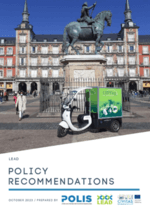
Budapest (Hungary)
Budapest, the capital of Hungary, lies in the middle of the Carpathian Basin in north central part of the country. The Danube River divides the city, which covers 525 square kilometres and has 1.7 million inhabitants. As Hungary's largest city, it is the country's political, cultural, commercial, industrial, and transportation centre.
The modal split in Budapest in 2010 was 50 percent for car use, 38 percent for public transport, 10 percent for walking and 2 percent for biking. In the larger agglomeration, the modal share for cars was 60-70%, with some 400,000 cars entering the city daily.
The Budapest Transport System Development Plan was approved by the Municipality in 2008. Although the plan includes recent considerations of sustainability, it emphasizes upgrading and developing the road network.
Recent transport measures in Budapest have focused on the operation of existing capacities and on certain co-financed projects. These include first of all the construction of a fourth metro line and related developments. Other measures include the development of certain tram lines and the extension of metro line 1 (the first on continent when it opened, already extended once in 1973). Pedestrian zones have been proliferating in the downtown area and bicycle infrastructure is also expanding. A bike sharing system called BUBI, due to open in 2013, offers many opportunities to deepen co-operation between bike users and public transport.
In 2010, the Municipality established the Budapest Transport Center (Budapesti Közlekedési Központ, BKK) to manage, integrate and commission all of the city’s urban transport matters, including public transport and construction and maintenance of roads and bridges. BKK has good co-operation with some NGOs, including ones dealing with cycling advocacy, and it plans to further embrace the approaches of mobility management and sustainable urban mobility planning.






















